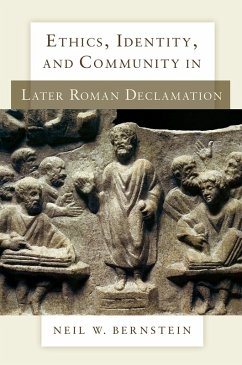
Figuring Genre in Roman Satire (eBook, PDF)

PAYBACK Punkte
8 °P sammeln!
Satirists are social critics, but they are also products of society. Horace, Persius, and Juvenal, the verse satirists of ancient Rome, exploit this double identity to produce their colorful commentaries on social life and behavior. In a fresh comparative study that combines literary and cultural analysis, Catherine Keane reveals how the satirists create such a vivid and incisive portrayal of the Roman social world. Throughout the tradition, the narrating satirist figure does not observe human behavior from a distance, but adopts a range of charged social roles to gain access to his subject ma...
Satirists are social critics, but they are also products of society. Horace, Persius, and Juvenal, the verse satirists of ancient Rome, exploit this double identity to produce their colorful commentaries on social life and behavior. In a fresh comparative study that combines literary and cultural analysis, Catherine Keane reveals how the satirists create such a vivid and incisive portrayal of the Roman social world. Throughout the tradition, the narrating satirist figure does not observe human behavior from a distance, but adopts a range of charged social roles to gain access to his subject matter. In his mission to entertain and moralize, he poses alternately as a theatrical performer and a spectator, a perpetrator and victim of violence, a jurist and criminal, a teacher and student. In these roles the satirist conducts penetrating analyses of Rome's definitive social practices "from the inside." Satire's reputation as the quintessential Roman genre is thus even more justified than previously recognized. As literary artists and social commentators, the satirists rival the grandest authors of the classical canon. They teach their ancient and modern readers two important lessons. First, satire reveals the inherent fragilities and complications, as well as acknowledging the benefits, of Roman society's most treasured institutions. The satiric perspective deepens our understanding of Roman ideologies and their fault lines. As the poets show, no system of judgment, punishment, entertainment, or social organization is without its flaws and failures. At the same time, readers are encouraged to view the satiric genre itself as a composite of these systems, loaded with cultural meaning and highly imperfect. The satirist who functions as both subject and critic trains his readers to develop a critical perspective on every kind of authority, including his own.
Dieser Download kann aus rechtlichen Gründen nur mit Rechnungsadresse in A, B, BG, CY, CZ, D, DK, EW, E, FIN, F, GR, HR, H, IRL, I, LT, L, LR, M, NL, PL, P, R, S, SLO, SK ausgeliefert werden.













